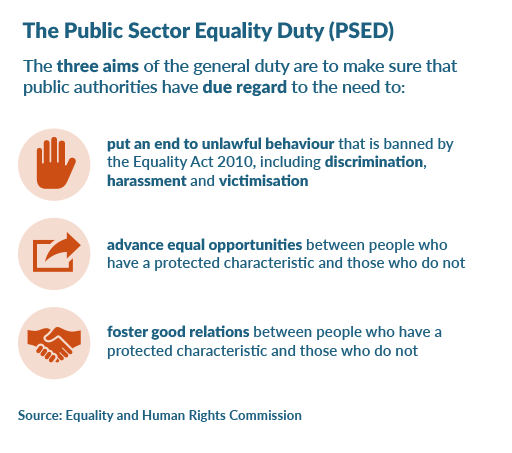2.5 The Public Sector Equality Duty
The Public Sector Equality Duty (PSED) is a legal obligation under the Equality Act 2010 that requires public bodies in England, Scotland, and Wales to consider how their decisions and actions affect people with protected characteristics.
It applies to:
- Public bodies (e.g. schools, hospitals, police)
- Private or voluntary organisations carrying out public functions (e.g. a private company running a prison or a train service franchise).
Watch this video from the Equality and Human Rights Commission for an overview of the Public Sector Equality Duty.
Public bodies must have ‘due regard’ to the need to achieve three main aims, as can be seen in Figure 9.
Here are some hypothetical examples of how public bodies might show due regard to the Public Sector Equality Duty:
A local authority reviews data on access to adult education and finds that older Black, Asian and Minority Ethnic women are less likely to attend digital skills courses. In response, it funds community-based sessions with translation support and flexible timings to meet both cultural and caregiving needs.
A city council is redesigning a public park and consults with older disabled residents and LGBTQ+ older people. Based on their feedback, it improves pathways for mobility aids, installs accessible toilets, and creates inclusive community spaces where everyone feels welcome.
Before launching a new healthcare initiative, a local health board conducts an Equality Impact Assessment (EIA) and identifies that older men from low-income and rural backgrounds have poorer access to mental health services. They adapt the policy by introducing local outreach clinics and transport assistance to reduce these inequalities.
Key points to remember:
- The PSED is about process, not outcomes. Public bodies must show they considered equality, even if the final decision isn’t perfect for all groups.
- It must be applied proportionately. More serious impacts require more thorough consideration.
- It’s a legal requirement. Failure to comply can lead to legal challenges.

